Key takeaways:
- Green certifications enhance business credibility and foster customer trust by affirming commitment to sustainability.
- Choosing the right certification involves evaluating specific requirements, potential networking opportunities, and aligning values with the provider.
- Being green-certified not only improves eco-friendly practices but can also lead to financial benefits through reduced operational costs.
- Engaging with a community of certified businesses provides valuable resources and encourages innovation in sustainable practices.
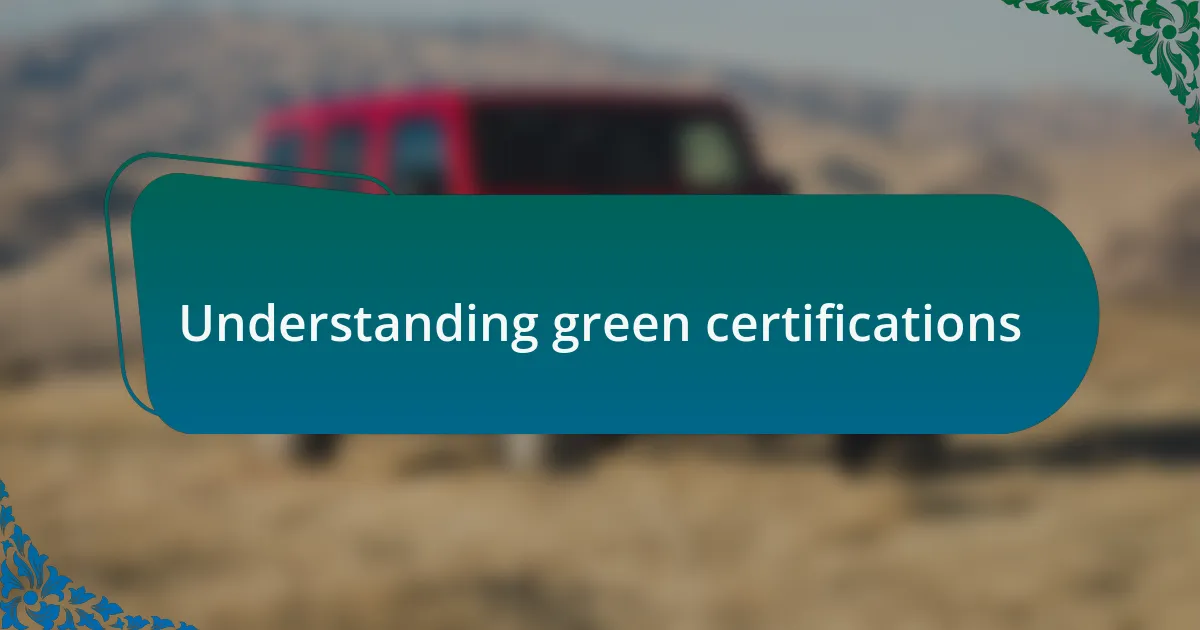
Understanding green certifications
Green certifications are like a badge of honor for businesses committed to sustainability. When I first encountered them, I felt a mix of curiosity and excitement. Which certification would genuinely reflect my values and efforts?
These certifications often require a thorough understanding of eco-friendly practices and standards. I remember the day I dove into the details of several programs; it was overwhelming but eye-opening. Each certification had specific criteria, and realizing the diversity of approaches ignited my determination to choose the right fit for my business.
What I found particularly compelling was the impact of choosing a certification that resonates with my mission. It wasn’t just about the label; it was about fostering a deeper connection with my customers who value sustainability. Have you ever wondered how a simple certification can enhance your credibility? My experience shows that it can open doors to new clientele who appreciate those green efforts.
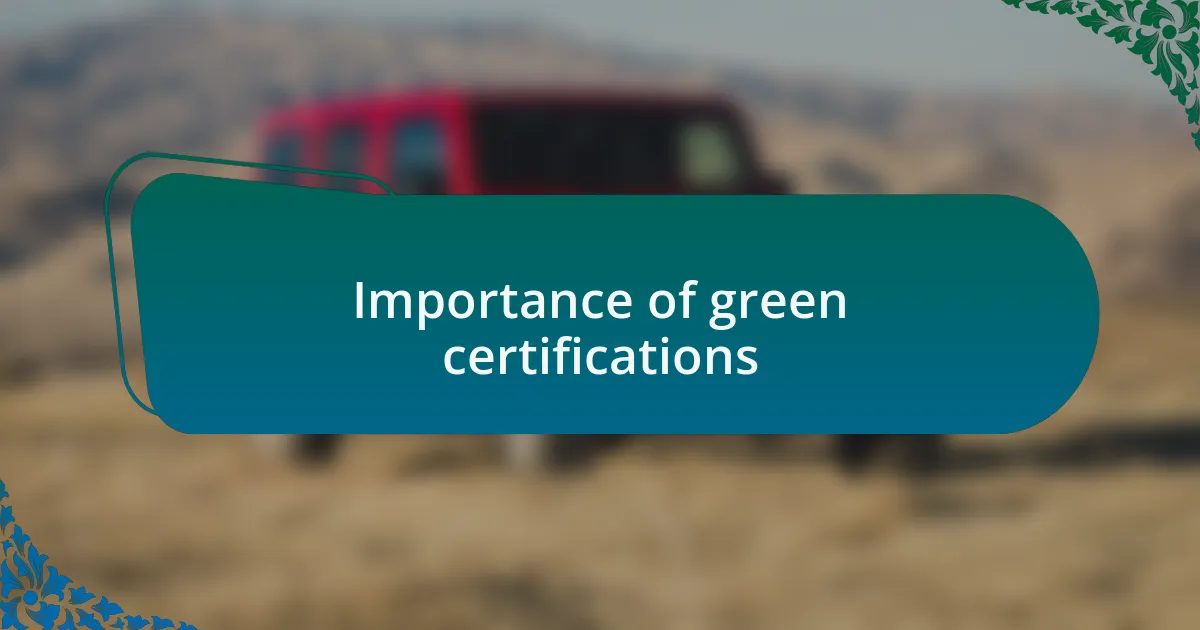
Importance of green certifications
When I first started exploring green certifications, I quickly realized their significance goes beyond mere compliance. They provide a framework for evaluating the environmental impact of my business. Interestingly, I found that customers often ask about our green practices; they want to know if we walk the talk. A credible certification can affirm my commitment and build trust, which is invaluable in today’s eco-conscious market.
The emotional weight of obtaining a respected certification was profound for me. I vividly recall the moment I received my first certificate; it felt like recognition for all the hard work my team and I put into making our operations more sustainable. It’s not just a piece of paper—it’s a testament to our values and a conversation starter with clients who share a passion for the planet.
Moreover, I’ve noticed that green certifications can significantly differentiate my business in a crowded marketplace. When potential customers see that I’ve invested time and resources into becoming certified, they perceive our operation as more reputable. Isn’t it incredible how a simple certification can reflect your dedication and attract like-minded clientele? It truly can reshape the way my business is viewed, fostering a loyal customer base that values sustainability as much as I do.
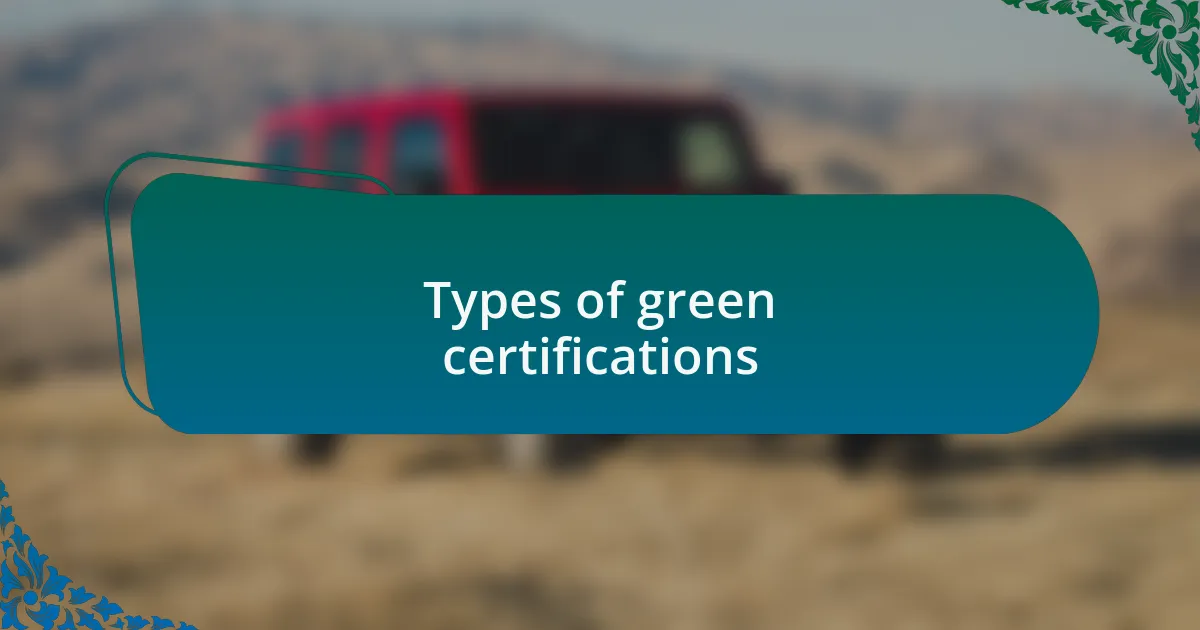
Types of green certifications
When diving into the types of green certifications available, I discovered a wide range, each tailored to specific aspects of sustainability. For instance, the ISO 14001 certification focuses on effective environmental management systems. I remember thinking about how this certification could not only streamline my operations but also allow my team to take pride in being part of a certified organization.
Another notable certification that caught my attention is the EcoLogo, which emphasizes the product’s entire life cycle and promotes sustainable practices. Learning about how this certification examines everything from sourcing materials to production processes reinforced my belief in taking a holistic approach to sustainability. Can you imagine the satisfaction of knowing that each aspect of my car wash operation contributes positively to the environment?
Lastly, there are niche certifications like Green Seal, which are particularly relevant to the cleaning industry. I found this certification incredibly helpful as it provided a clear set of standards for selecting eco-friendly cleaning products. Reflecting on my journey, I realized how these certifications forged a deeper connection with suppliers and actualized my vision of creating a greener business. How can one not feel inspired by striving for excellence in sustainability while engaging others in the process?

Evaluating certification requirements
When evaluating certification requirements, I learned that each certification has its own specific criteria, which can sometimes feel overwhelming. I remember sitting at my desk, reading through the fine print of various certifications, and thinking about how each tiny detail could significantly impact my operations. It struck me that understanding these nuances was crucial for aligning my business goals with sustainable practices.
One key factor to consider is the level of documentation and reporting required by each certification. I found myself pondering the amount of time and resources I would need to invest to maintain compliance. This reflection led to the realization that a comparatively straightforward certification might be more beneficial for my team and overall efficiency, allowing us to focus on what we love – providing excellent service.
Lastly, I realized the importance of future scalability when selecting certifications. Would these standards still hold value as my business grows? I often grappled with this question, recognizing that today’s decisions could impact my long-term mission. It’s a bit like planting a tree; I wanted to ensure that its roots would be strong enough to support broader branches in the years to come.
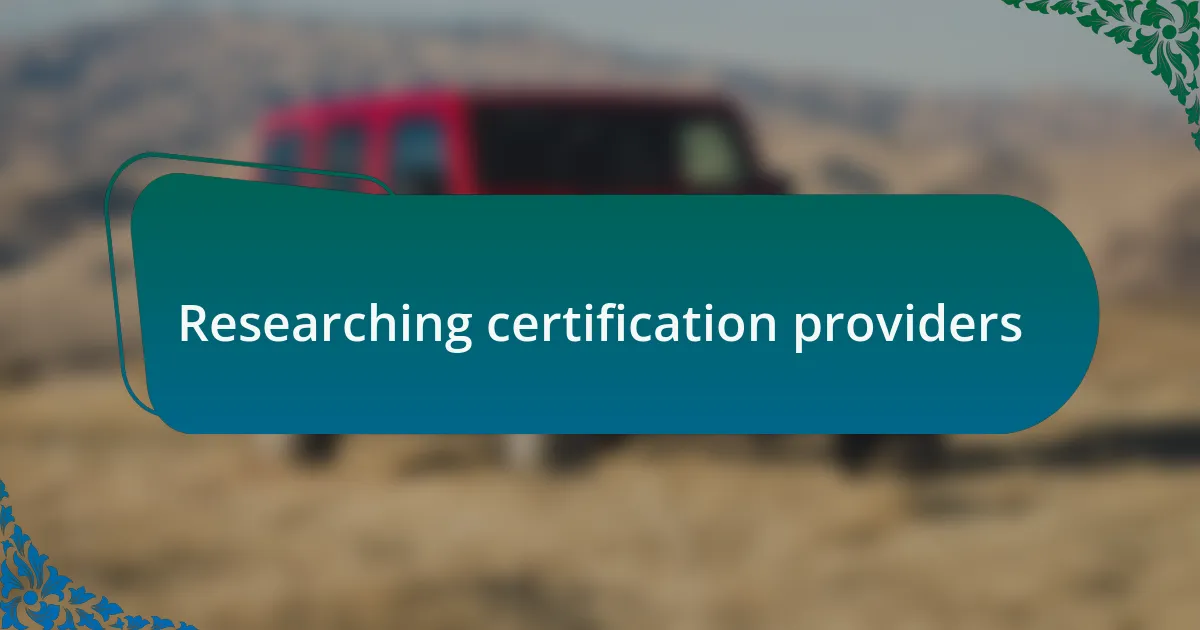
Researching certification providers
When I set out to research potential certification providers, I immersed myself in their websites and reviewed their credentials. I distinctly remember a late night spent scrolling through reviews and testimonials, trying to gauge the credibility of different certifications. It struck me how valuable real voices and experiences could be; after all, I wanted assurances from those who had walked this path before me.
During this process, I found it helpful to connect with other business owners who had already been through the certification journey. I reached out to a few local colleagues, and it was enlightening to hear their firsthand experiences. Did they feel the certification’s value justified the effort? Their insights often echoed my own concerns about whether the certification brought tangible benefits or simply added another layer of complexity.
I also kept an eye on the ongoing support offered by each provider. I pondered, “Would I be left to navigate compliance on my own, or would there be guidance available along the way?” This led me to favor providers who offered robust resources, such as training sessions or dedicated points of contact, reassuring me that I wouldn’t be alone as I embraced this journey of sustainability in my business.

My selection process
Determining which green certification to pursue was no small feat. I spent countless hours weighing the pros and cons of each option, creating a spreadsheet to compare key attributes like costs, training requirements, and renewal policies. It felt like I was trying to decipher a complex puzzle, but I knew that making the right choice was crucial for the sustainability goals of my car wash.
Another pivotal aspect of my selection process was the alignment of values. I often asked myself, “Does this certification resonate with my vision for eco-friendly practices?” When I found a provider that not only emphasized environmental responsibility but also actively promoted community engagement, I felt a spark of excitement; it was as if we shared a common mission. That connection made all the difference in my decision-making.
As I delved deeper, I realized the importance of potential networking opportunities that came with each certification. My mind raced with possibilities: How could connecting with other certified businesses enhance my operations? I still recall the sense of camaraderie I felt when I joined a local conference hosted by one of the providers. It reinforced my belief that the right certification could open doors beyond compliance, creating a community of like-minded entrepreneurs dedicated to making a positive impact.
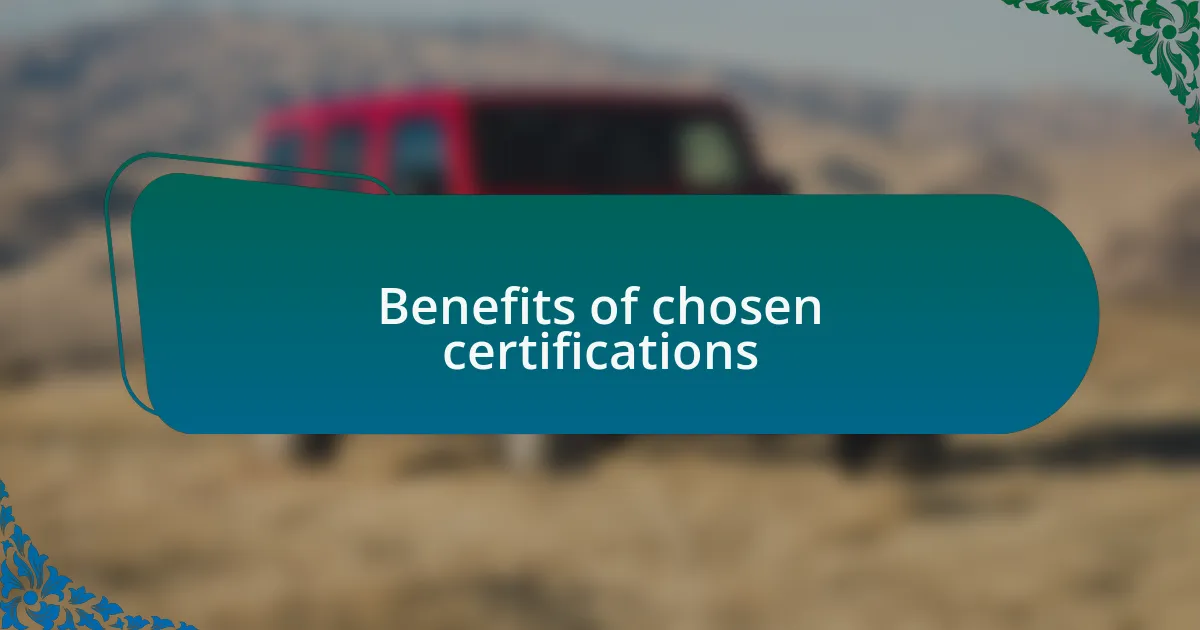
Benefits of chosen certifications
Choosing the right green certifications for my car wash didn’t just elevate our eco-friendly practices; it enhanced our brand reputation. I still remember the first time a customer mentioned how our certification made them feel more confident in choosing us over competitors. That moment reinforced my belief that green certifications not only attract environmentally conscious clients but also build trust within the community.
One of the most rewarding aspects is the financial benefits that come from being green-certified. Initially, I was hesitant to invest in the certification process, but once I started noticing a decrease in operational costs—particularly in water and energy use—I felt a wave of relief. Isn’t it fascinating how sustainability can also lead to increased profitability? This dual advantage of being eco-friendly and financially sound has truly transformed my approach to business.
Additionally, joining a network of certified businesses opened my eyes to invaluable resources I could have never accessed on my own. I vividly recall a workshop I attended through my certification body, where partnerships sparked new ideas for eco-friendly services. Just think about how sharing best practices with other passionate entrepreneurs can drive innovation! The camaraderie and shared vision I experienced made me realize that these certifications go far beyond compliance; they foster a supportive community that inspires continuous improvement.